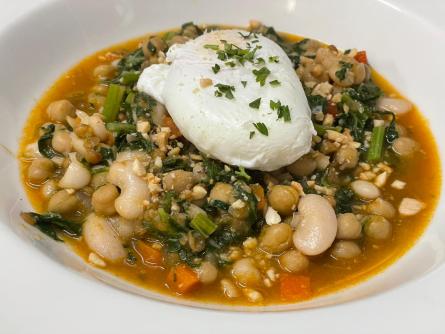Legumes take centre stage in the actions promoted by the Sitges Town Council for healthy eating
With the aim of raising public awareness of the nutritional benefits of eating pulses, the Sitges Town Council's Public Health Department, in collaboration with the Slow Food association and the Sitges Catering Guild, are joining in the commemoration of International Lugume Day, declared by the United Nations General Assembly.
Pulses are sustainable foods due to their low carbon footprint. The cultivation of these vegetables helps to fix nitrogen in the soil and, therefore, they do not require nitrogen fertilisers. They are recommended to be eaten at least 4 times a week, as they provide beneficial nutrients for health such as fibre, vitamins, minerals, antioxidants, proteins and carbohydrates. They are also important for cardiovascular health, prevent some types of cancer and type 2 diabetes, help to feel full and prevent obesity.
Among the activities programmed is a cooking day based on pulses, which will bring together chefs of different nationalities. It will be held on 19 February at 6 p.m. at the Institut Joan Ramon Benaprès. Professionals from Uruguay, Japan, Senegal, Ukraine, Morocco, France, Mexico and Chile who live or work in the Garraf region will cook a traditional recipe from their country of origin with pulses as the main ingredient. The event, which is aimed solely at the media, can be viewed later on the social networks of the promoters and organisers. A digital book with the recipes will also be published and can be downloaded free of charge at www.sitges.cat.
In parallel, between 19 February and 3 March, 15 restaurants of Sitges will be taking part in the First Legume Days in Sitges restaurants, recommending one or more dishes from their menus with this ingredient as the main ingredient.
Chefs taking part in the 'Un tomb pel món amb llegums' event:
- Yassine Essahli, from La Salseta de Sitges - Vegetable Tahine
- Dario G. Senatre, from La Cocina de Sitges - Homemade cappelletti, stuffed with lentils, mushrooms and new pecans
- Katerina Golodnikova, from the restaurant Picnic de Sitges - Vegetable Borsch
- Lila Pascale, from Dosa Nova restaurant in Sitges - Haricots de Soissons
- Massamba Sow, from the Sports Bar in Sitges - Beans with Cassava
- Natsumi Nakamori - "Gomoku" Japanese stewed soybeans
- Paola Riberos Sepúlveda, from La Pícara Sitges - Beans with reins".
- Blanca Velia Pérez Sánchez, from Corazón de Agave de Sitges - Huitlacoche Quesadilla with Black Beans
- Núria Lucas, from the restaurant el Dinou in Vilanova i la Geltrú - Chickpea and pickled asparagus crests
- Pedro López - Chickpea "Mojete".
First Legume Days in Sitges restaurants (from 19 February to 3 March)
- Acqua - Chickpeas with Garraf beans and codfish
- Cocina de Sitges - Cappelletti stuffed with lentils, mushrooms and pecan nuts, served with vegetable consommé.
- Dosa Nova - Masala Dosa with King Dhal
- El Vivero - Hake with beans or tripe with chickpeas
- Hibou - Pâté en croûte of legumes (lentils, chickpeas and beans) vegetables and herbs
- La Nansa - Chickpeas and beans with poached egg at low temperature
- La Oca - Pocha beans with clams
- La Salseta - 'Mongetes del ganxet' with cabbage and cod innards
- Marenostrum - Chickpea stew with vegetables
- Mascarón - Chickpeas with crabs and galleys in seafood style
- Merci - Chickpeas with prawns
- PicNic - Galician style octopus on a white bean purée
- Sofía - Smoked Potato Cream with Bacon Jelly and Braised Lentils
The Slow Food Movement
The Slow Food movement brings together communities of cooks from all countries. It is an alliance of cooks who are committed to using good quality, local ingredients produced by farmers, shepherds, fishermen, livestock breeders, butchers, bakers and artisans who preserve traditional skills and knowledge, working with respect for the environment, the landscape and animal welfare. They organise activities such as their current challenge, Planting the future, which aims to promote food change among the population through podcasts, recipes and advice to protect health, animals and the planet.
Share

